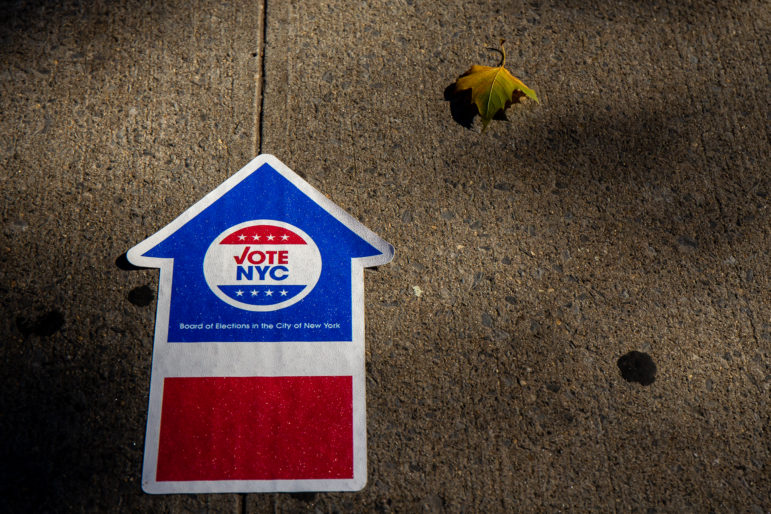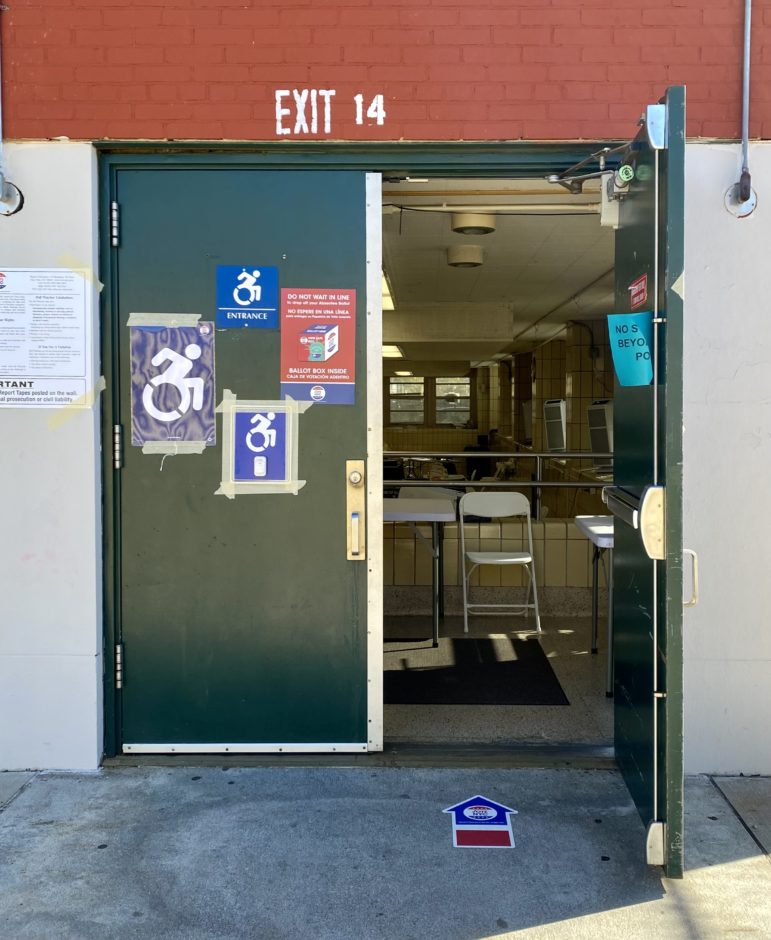Voters’ varying perspectives and reluctance to share their views with a reporter seemed to reflect the deeply divisive nature of politics in 2022.

Adi Talwar
A marker directs voters to their poll site on Election Day
Heated races for Congress and governor drove a steady stream of voters to the polls at Staten Island Technical High School Tuesday, where turnout at 11:45 am was nearly five times higher than at a similar time on primary day in June.
All told, 643 Staten Islanders had cast their ballots at the high school as noon approached, with a consistent flow of voters arriving over the next hour and a half. “It’s a very nice turnout,” said poll site coordinator Anthony Raiola,”with no problems.”
Nearly 35,868 people voted early in the borough, according to the city’s Board of Election. About 40 people were already lined up outside Staten Island Tech when the site opened at 6 a.m., Raiola said.
But voters’ varying perspectives and reluctance to share their views with a reporter seemed to reflect the deeply divisive nature of politics in 2022.
City Limits talked with 24 voters outside the polling site mid-day Tuesday. Five said they voted for Gov. Kathy Hochul and Congressional candidate Max Rose, both Democrats, while three said they picked Republican gubernatorial challenger Lee Zeldin and incumbent Rep. Nicole Malliotakis. Another 16 people declined to say who they selected.
“I only discuss politics with close friends and family, but the key is to vote your conscience and make sure you’re informed,” said Mike Foster, 71. “It’s OK to cross party lines if you know what you’re voting for.”
While mid-term turnout tends to trail far behind presidential contests, Foster said local races are crucial for democracy.
“People don’t realize the small elections are more important than the presidential election because you’re deciding what happens at the ground level,” he said. “If you don’t have a strong foundation, the whole thing falls apart.”
Throughout the early afternoon, just a handful of voters were willing to discuss what drove them to the polls. Only a few would give their full names.

David Brand
Hundreds of voters had cast their ballots at Staten Island Technical High School by 11:45 a.m. on Election Day 2022.
Marilyn Carretta, a retired state worker who previously talked with City Limits outside the school in June, said she was voting to defeat Rep. Nicole Malliotakis and politicians aligned with ex-President Donald Trump. Carretta called Malliotakis “the biggest hypocrite in politics” because she voted against certifying the results of the 2020 presidential election following the far-right Jan. 6 attack on the Capitol. Democracy was at stake Tuesday, she said.
“They’re supposed to be the party of law enforcement,” she said, referring to Republicans. “But [Malliotakis] sides with the insurrectionists who used an American flag to beat Capitol police.”
Two people who said they voted for Republicans declined to give their names. They both said “crime” was the issue most important to them. Though shootings and murders have decreased this year in New York City, the number of other major crimes, including rape and robbery, have risen, according to NYPD data. GOP candidates, including Malliotakis and Zeldin, have made that spike in crime the focus of their campaigns.
A third GOP voter shared a more disturbing perspective. The 61-year-old man told City Limits he was motivated to vote by anti-Semitic conspiracies about COVID-19 and control of the global financial system—a centuries-old bigoted myth—that he said he learned from a 12-hour neo-nazi propaganda film.
“It’s not a conspiracy,” he said, when challenged on his views.
“No it’s not,” another man shouted in agreement as he passed by.
And yet, the man said he voted for Lee Zeldin, who is Jewish.
“We have to get Hochul out,” he said. “She’s going to free all the criminals.”








